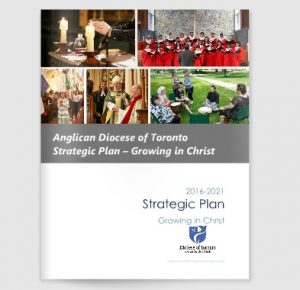By Stuart Mann
The Diocese of Toronto has a new strategic plan, called Growing in Christ, that will guide its work and the deployment of its resources over the next five years.
The plan, approved by Diocesan Council on June 23, casts a vision for the diocese and includes a mission statement, values and key focus areas.
“It builds on and strengthens what we’re already doing,” says Archbishop Colin Johnson. “It’s not a radical 180-degree change, it’s not even a 90-degree change, but it says that this is the direction we need to go in and this is how we need to align ourselves to get there. I think it’s very hopeful.”
 The plan was developed over the past six months with input from more than 700 people, including bishops, clergy, laity and Diocesan Centre staff.
The plan was developed over the past six months with input from more than 700 people, including bishops, clergy, laity and Diocesan Centre staff.
“There was a fairly significant agreement with what people told us,” says Archbishop Johnson. “The fact that people had the opportunity and were willing to participate is a really healthy sign for the life of the diocese. And all the input was considered.”
Growing in Christ presents a vision of the diocese to be “an Anglican community committed to proclaiming and embodying Jesus Christ through compassionate service, intelligent faith and Godly worship.”
The diocese’s mission is to “build healthy, missional Anglican communities that engage faithfully with the world and share the Gospel of Jesus Christ.”
Supporting the vision and mission are the core values – faith, compassion, collaboration, accountability and boldness – that will guide how decisions are made and how Anglicans will work and interact with each other.
The plan identifies five “focus areas” that the diocese will concentrate on over the coming years. They are leadership and formation, trust and culture, innovation based on evidence, governance and decision-making and stewardship of resources.
Each focus area comes with two or three initiatives that will help the diocese reach its goals in that area. For example, in the area of leadership and formation, the diocese will: develop leaders, both clerical and lay, to lead the transformation of the diocese; will expand the availability and practice of continuous education for both clergy and lay leaders; and will adopt new models of formation and diversity of leadership.
Archbishop Johnson says the next stage of Growing in Christ is to develop action steps that will help make the initiatives become a reality. That will involve consultations with Diocesan Council, bishops, staff, clergy and parishioners, and others. Some of those discussions are already underway.
“Even as we develop the action steps, we’re going to start to implement them,” he says. “The overall plan now needs to move from paper and visuals to concrete action.”
Archbishop Johnson says Growing in Christ will have implications for the next diocesan budget. “It will help us establish some priorities. It will shape how we make decisions about how we spend our money and how we steward our resources. It will be a framework against how our budget priorities will be tested.”
He thanked all those who worked on the plan, especially the steering committee, chaired by Susan Abell, diocesan volunteer and a churchwarden of St. Mark, Port Hope. The other committee members were Anita Gittens, president of the Anglican Church Women and a churchwarden of St. Paul the Apostle, Rexdale, the Rev. Sherman Hesselgrave, incumbent of Holy Trinity, Trinity Square and regional dean, Peter Patterson of Christ Church St. James, Toronto and business director of Wycliffe College, and Archbishop Johnson. Staff support was provided by Kathryn Rogers, the diocese’s treasurer and director of Finance, and Pam Boisvert, the diocese’s assistant secretary of Synod.
The diocese developed Growing in Christ in consultation with Optimus SBR, a management consulting firm in Toronto. Ms. Abell praised the firm for its skill and efficiency. “They set a very ambitious schedule for us and they really delivered. Everybody worked together. It’s a good feeling to think that we can now put our heads together and have something to build on.”
Ms. Abell, a former executive director of the Children’s Aid Society of Ottawa, has worked on a number of strategic plans and says the diocese’s plan is very inclusive. “One can truly say that every effort was made to include the voices of all the different parts. There could always be more input, but I think the consultants worked hard and were successful in engaging a broad spectrum of people.”
Archbishop Johnson says strategic plans are an effective way for dioceses to discern their role in God’s mission. “Strategic plans can be construed as sort of a business-type model, but I think for Christians they can be a prayerful response and consideration of what God is calling us to do together at this time. It’s actually a process of discernment, of how we will participate faithfully and meaningfully in God’s mission.”